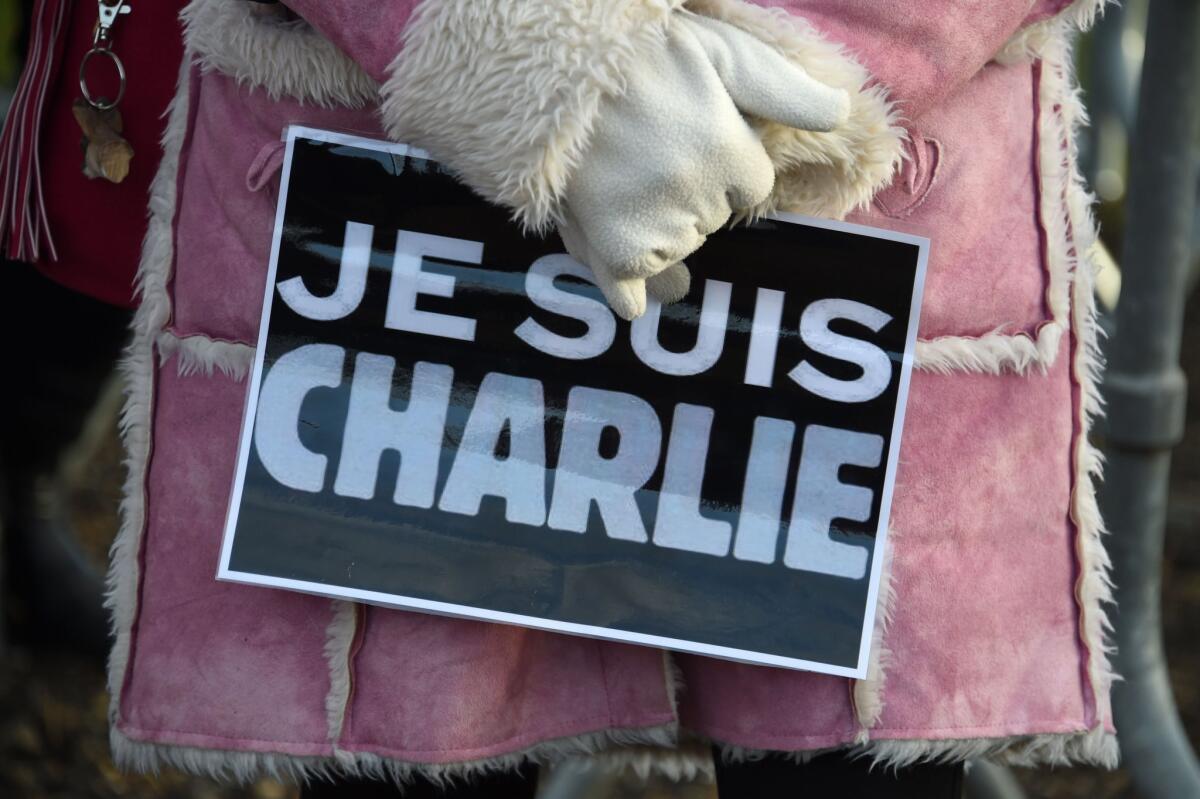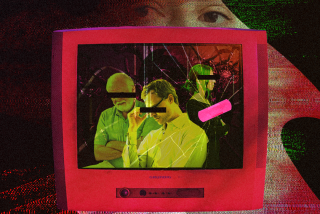Op-Ed: Charlie Hebdo cartoonists: heroes or racists? The answer’s not that simple

- Share via
Years ago, I served on a jury that had trouble making up its mind. After we sent the judge one too many questions, he brought us back into the courtroom to impress upon us a distinction. There are questions of law and there are questions of fact, he said. It wasn’t up to us to decide what was against the law and what wasn’t; the state legislature had already done that. We were only responsible for answering a question of fact. Had the person in the dock actually done what the prosecution accused him of doing?
In practice, questions of law and questions of fact can be quite entangled. But the distinction seems useful, even if it’s rarely absolute, and I’d like to suggest that a distinction like it may help in parsing the dispute currently raging over PEN American Center’s plan to give its Free Expression Courage Award to the French satirical newspaper Charlie Hebdo.
Ten of Charlie Hebdo’s staff and contributors were killed by Islamic extremists in January. Some writers who belong to PEN — six originally, but by late Thursday the number had jumped to 145 -- believe that Charlie Hebdo ought not to be honored at a gala scheduled for Tuesday, because they believe that some of the newspaper’s content is bigoted or racist.
It’s with some trepidation that I write about the dispute, because I’ve been friendly for a long time with writers now on both sides of it. I’m also a member of PEN. At my own peril, however, here is what I have to contribute:
The distinction I’d like to make isn’t between law and fact, because there aren’t any serious questions of law here; in France as in America, legislatures decided long ago that it’s a crime to kill a person for something he said.
The distinction is between ethics and fact. I think the two sides are under the impression that they disagree about ethics, when in actuality they probably agree. And I think they disagree vehemently about the facts, even though both sides believe the facts are, or should be, obvious.
Ethics first: Of course it’s wrong to kill a cartoonist for a cartoon, but is it right to honor a murdered cartoonist for courage if the cartoon that provoked his murder was racist? As ethical questions go, that’s pretty sophomoric. If you had asked the debaters to answer it a year ago, I think you would have found near unanimity in their responses. Yes, a cartoonist killed for a racist cartoon was being courageous if he drew it knowing that he might be killed for it. But no, it isn’t right to honor him.
In the last week, I’ve seen people refer to the cartoons in Charlie Hebdo as “hate speech.” And if it seems to you that cartoons in Charlie Hebdo are racist or bigoted, then you probably think it’s tone-deaf or worse for PEN to give the newspaper a posthumous award. If, on the other hand, it seems to you that the cartoons are innocent of malicious bias, you probably think it’s cowardly for PEN to hesitate.
So here’s the real question: Is Charlie Hebdo racist? And how can you tell a racist cartoon from one that merely references racial stereotypes? It’s a delicate question to raise, because debate on it has been inhibited in many quarters by the notion that it ought to be obvious when a message is racist, and that those who fail to recognize racism as soon as they come across it are either pretending ignorance or revealing a fault in their inner moral compass. The bulletproof answers aren’t “yes” or “no,” but “of course it is” or “of course it isn’t.”
Reality doesn’t always conform to this polarity. In America’s cultural ecosystem, we tend to grant a fair amount of license to stand-up comedians to deploy racist and bigoted stereotypes. The tacit permission depends in some cases on a sense conveyed to the audience that the comedian’s underlying impulse is to bring a stereotype out into the open so as to defuse it. Audiences also grant leeway to a comic who belongs to the race that he’s mocking.
In other words, it may be obvious at a glance whether an image or a phrase refers to a racial stereotype, but to determine whether a message is racist, a viewer has to consider the current political context, and has to make a subjective assessment of the comedian’s intentions. Even then, different observers may come to different conclusions.
The cartoons in Charlie Hebdo depend for their meaning on memes that won’t be familiar to anyone who isn’t a regular reader of French newspapers. I can read French, but I don’t keep up on French domestic politics, and I draw a blank when I look at most Charlie Hebdo cartoons. Many people have said they aren’t funny, and yeah, I have to agree, for two reasons.
First, they’re puerile — pitched at roughly a Mad magazine level of sophistication. Taste is to a great extent learned, and I’m afraid that an American reader of my ilk just isn’t likely to find vulgar cartoons about politics much to his taste. Second, Americans can’t find these cartoons funny because the cartoons always have to be explained to us. We don’t recognize the political figures being caricatured; we don’t know the political slogans being tampered with.
By this point, I’ve probably tipped my hand, and I’ll go ahead and lay my cards on the table: I don’t think Charlie Hebdo is racist, and I think that some of the American writers who have condemned it must have had the subtitles off while they were trying to make a determination that can be tricky to make even about an American message designed for American consumption.
More than 3 million French citizens rallied in solidarity with Charlie Hebdo a few days after the January murders. Were those marchers complicit with racism and bigotry at the newspaper, or unable to recognize them? I strongly doubt that there would have been such a broad outpouring of support for Charlie Hebdo in France if it were a French analog of the Westboro Baptist Church — the group famous for conducting anti-gay protests at military funerals. When it comes to telling whether a French newspaper smells sweet or sour, I think the French are likely to have the more discerning noses.
Even in the worst-looking examples that I’ve seen, the object of satire always turns out, upon research, to be the racist ideology that the cartoonist believes is lurking just below the surface of slogans circulated by French right-wing politicians; or the impious impulses that the cartoonist believes are hidden beneath a cleric’s pious front.
It’s possible, of course, to see the antiracist message in Charlie Hebdo cartoons as no more than a cover for an underhanded relishing of the racist imagery deployed in it. Parody usually does participate to some extent in the energy of what it parodies; that is one of the risks it runs.
Instead of ending with a peroration, I’m going to end with a request for empiricism. I don’t think you can know where you stand about PEN and Charlie Hebdo unless you’ve made a judgment about Charlie Hebdo’s humor. And if you haven’t been living in France and following the news there, I don’t think you’ll be able to do that fairly at a glance.
Caleb Crain is the author of the novel “Necessary Errors.”
Follow the Opinion section on Twitter @latimesopinion and Facebook
More to Read
A cure for the common opinion
Get thought-provoking perspectives with our weekly newsletter.
You may occasionally receive promotional content from the Los Angeles Times.






